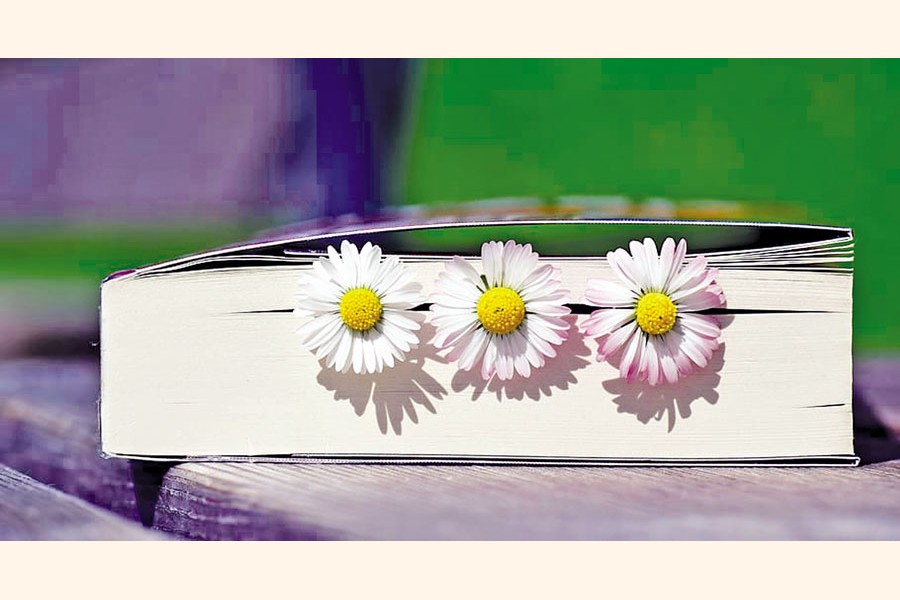
Published :
Updated :

What do a Facebook meme, a good novel, and our textbooks have in common? We all have to read them. Reading has become an indispensable activity in our lives. However, reading is not usually something that everyone enjoys all the time. For example, you can observe the distinct difference between a student glancing through their textbook and someone reading their favourite book. However, in the age of social media and the curtailed attention span of youths, reading is evolving. Merely saying words aloud from books is not enough anymore. The new generation always wants something exciting and new, traits that they do not associate with books, especially textbooks. So, we will dig deep and find out how to put the habit of reading back on top.
Four students' take on textbooks: The type of books that are read by the youth the most is textbooks. The structure in which the textbooks are written is heavily reliant on the academic curriculum present in Bangladesh. That being said, the structure in question is not a popular one amongst most students.
"Now I like reading textbooks, because they are diverse, and sometimes it seems like authors are expressing my words," said Md Shadman Shabab, a student at Shahjalal University of Science and Technology, studying Economics. He had never read a book other than textbooks in his school-college days.
Another student from the same institution, an industrial and production engineering student Md Fahim Uddin Emad, said, "If I get a book of my interest, I enjoy reading it till the end." When he finds any reading materials or theories difficult, he simply leaves or crams them depending on the situation. "But I am pretty much sure that I will get some implications in my lifespan from these theories, and a large portion of them won't be used," he continues.
Sofia Noor Rafa usually reads textbooks in-depth. Although reading depends on mood, she has other thoughts on this. When she finds a particular topic difficult or not much interesting, she forces herself to read them anyway for examination purposes. According to this computer science student of East West University, social media is responsible for readers' block and one of the causes of it is reading without pleasure. It is a situation in which even if a student has the habit of reading, they can't find consistency in it.
Tanjim Hasan Patwary is a student of Banking and Insurance at the University of Chittagong. Although he tries to relate the study topics to practical-life implications, sometimes he can't. "Since the majority of the books in our university are authored by foreign writers, the contexts do not necessarily correspond to Bangladesh," he argues.
Studying system that seems interesting to them: With the shortcomings of the textbooks and some reasons behind them being discussed, it is necessary to find out what the students want as their preferred style of academic style. With the correct academic style in place, the textbooks can also take their shapes accordingly.
Shabab wants academic classes in a way where the practical aspects of theory will be prioritised over assertions. Assessment tests will focus on pertinent questions that can be answered precisely in fewer words.
"I will be pleased if I go through such a system where faculty will be well-trained in enabling students to seed interest in particular areas," admits Emad. Moreover, Sofia expects an alternative education system that may have variations and distinct underlying patterns. She asserts, "There is always a need for alterations, like the vast variations persisting in the case of computer-versions, machine-learning, and so on."
Tanjim does not like the mere certificate provider education system. Rather, he dreams of a more practical one with no more theories that don't have practical-life implications.
It is no surprise that the students in question are not a big fan of memorising chapters for the sake of it. Making lessons practical and diversified is one of the many popular demands from the students' front.
Multiverse magnitude of reading: According to an OECD (Organization for Economic Co-operation and Development) study, children who read books frequently when they were 10 and more than once a week at age of 16 have better outcomes in vocabulary, spelling, and mathematics examinations. It is also associated with things like general knowledge, memory abilities, and decision-making in the later periods of life.
In February 2020, King Edward-Vi Handsworth School for Girls in England implemented its "2019-2021 Reading for Pleasure Policy". This policy outlines how staff, students, and parents collaborate to instill a love of reading in all.
According to the SDG Tracker portal of Bangladesh, the proportion of children and young people who achieved leastwise a minimum proficiency level in mathematics, reading Bangla, and English at the end of lower secondary school was 57 per cent, 54 per cent and 19 per cent respectively in 2015, which is far below the targets of 85 per cent, 85 per cent, and 75 per cent set for 2030.
In this regard, some ideas may be formulated. Firstly, hosting frequent book-hunting competitions: It can be a review or quiz based on non-text books or a quiz or visualisation created from textbooks that pique readers' attention. In the case of textbooks, students will enjoy making graphs, charts, etc.
Making reading a pleasurable part of the timetable can also be included. This can be a dedicated reading time of at least 1-hour with no homework or revision obligations, but it's all about free choice, and a means to keep track of all current-world information through newspapers, articles, websites, etc. Revamping the Ekushey Boi Mela with a contemporary theme to attract more youths and turn them into book readers can also be a feasible plan.
The writer is currently a third-year student of Economics at Shahjalal University of Science and Technology (SUST).
suraiya36@student.sust.edu


 For all latest news, follow The Financial Express Google News channel.
For all latest news, follow The Financial Express Google News channel.